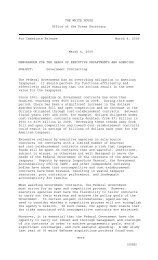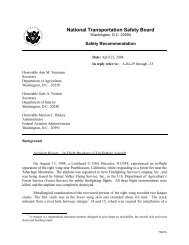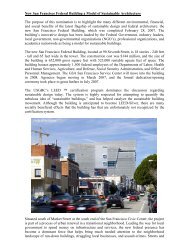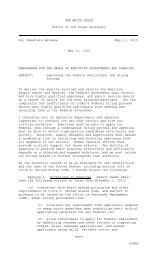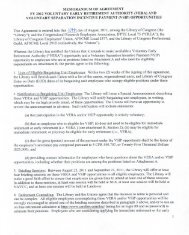Accenture's fifth annual global e-government study
Accenture's fifth annual global e-government study
Accenture's fifth annual global e-government study
You also want an ePaper? Increase the reach of your titles
YUMPU automatically turns print PDFs into web optimized ePapers that Google loves.
In January 2004, the French Government unveiled<br />
a new strategy and action plan for 2004 to 2007,<br />
called ADELE (ADministration ELEctronique). The<br />
program aims at driving progressive and consistent<br />
development of services to better serve citizens,<br />
businesses and public servants in a coherent and<br />
coordinated way. ADELE constitutes the framework<br />
of eGovernment initiatives in different areas such as<br />
technical infrastructure, interoperability standards,<br />
security, smart cards, training programs and partnerships.<br />
The program defines both qualitative and<br />
quantitative objectives and allocates €1.8 billion to<br />
140 initiatives, including major programs such as<br />
COPERNIC (renewed tax account systems), ACCORD<br />
(a modernized state financial system), “Allo Service<br />
Public,” SESAM-Vitale, and the electronic national<br />
identification card that will be developed and<br />
launched in 2006.<br />
The <strong>government</strong> aims at achieving €5 billion to<br />
€7 billion in productivity gains per year from 2007<br />
through these and other initiatives. The newly created<br />
Agency for the Development of the Electronic<br />
Administration coordinates the development of the<br />
action plan in close cooperation with ministries,<br />
local authorities, and representatives from medical<br />
and social institutions, industries, unions and users.<br />
Annual assessments of the implementation are<br />
planned, as well as citizen satisfaction surveys.<br />
Although increasing, Internet penetration remains<br />
low in France, at less than 30 percent. Among the<br />
12 countries surveyed for citizens’ attitudes, France<br />
has the second lowest regular Internet usage, just<br />
ahead of Spain, far below Sweden (80 percent regular<br />
users), the United States (66 percent) and the<br />
United Kingdom (53 percent).<br />
However, a high proportion of regular Internet users<br />
have used eGovernment, with one person in three<br />
doing so regularly. Looking for information is the<br />
primary usage of eGovernment sites in France, but<br />
nearly 30 percent of the visits relate to conducting<br />
transactions. Most French users appear to appreciate<br />
the advantages of eGovernment; the Internet is the<br />
preferred method to communicate with <strong>government</strong><br />
for 49 percent of them.<br />
Driving up usage of the Internet in general and<br />
of eGovernment in particular are top priorities<br />
for France to derive real value from the program.<br />
In 2003, the French <strong>government</strong> created an<br />
interministries delegation dedicated to develop<br />
Internet usage. The broadband expansion, gathering<br />
3.5 million subscribers by the end of 2003 (out of<br />
21 million Internet access subscribers) may pave the<br />
way to further progress.<br />
Other challenges are on the horizon. France appears<br />
ahead in many areas where innovation is taking<br />
place, but needs to move to a new phase of broader<br />
service implementation with an integrated technical<br />
architecture and higher usage. The complexity of the<br />
French administration (combining national, regional,<br />
district and local-city levels) naturally results in<br />
numerous sites that need to be coordinated to offer<br />
coherent services. Providing integrated eGovernment<br />
services is a challenge, particularly as competencies<br />
get redefined in the context of a decentralization<br />
process. It requires strong coordination among different<br />
levels of administration and creates some<br />
obvious complexity. Some cross-cutting projects are<br />
currently being tested (for example, the Ministry of<br />
Education is collaborating with some regions to set<br />
up a platform for services for schools). The results<br />
will have to be assessed to determine whether the<br />
program answers users’ needs and articulates what<br />
national and regional competencies are needed.<br />
A citizen-centric approach should drive transformation<br />
within the administration, which will require process<br />
reengineering and change management. The administration<br />
will need to set up the appropriate conditions<br />
of interoperability between agencies’ back offices to<br />
mask the organizational complexity and get the highest<br />
profit from e-enabling paper-based exchanges. It<br />
will also need to respect fundamental principles, such<br />
as equal treatment of all citizens and confidentiality<br />
of personal data. This phase of reengineering is a<br />
key issue and an essential condition for adding new<br />
high-value services to citizens. Tackling this problem<br />
will require increased communication to convert the<br />
public agents and the citizens to these new practices.<br />
In a strong eGovernment position thanks to the results<br />
the country has achieved to date and a firm <strong>government</strong><br />
will to modernize the French administration,<br />
France appears ready to face its future eGovernment<br />
challenges. Beyond its national responsibilities, France<br />
is involved in constructing the European Union electronic<br />
administration and international projects<br />
bound to the governance of the Internet. The ability<br />
to face the challenges of its ambitions is now crucial<br />
to establish France as a leader in eGovernment.<br />
75





